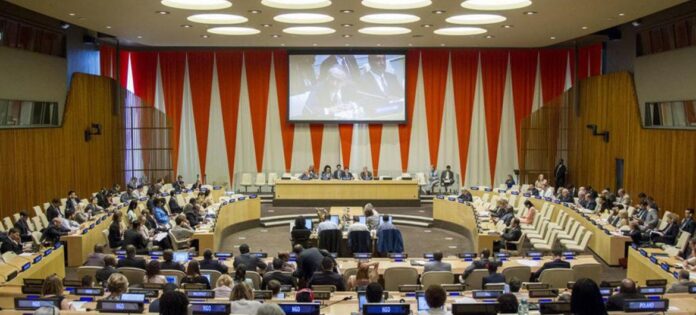In his capacity as Chair, Md Monwar Hossain, Bangladesh’s Chargé d’Affaires to the UN, shared some highlights of PBC’s 2022 programme of work, describing six months of progress – beginning with an emphasis on delivery.
“By responding to demands in a timely manner, country specific meetings have been held at the requests of Colombia, Central African Republic, Guinea Bissau, Liberia and Burkina Faso, while regional meetings took place on Sahel, Lake Chad Basin, and Pacific Islands to discuss specific peacebuilding challenges and priorities of those countries and regions,” he said.
Ownerships, partnerships and funding
Prioritizing national ownership and inclusivity, Mr. Hossain said “good strides” have been made in promoting inclusive approaches to peacebuilding, such as engaging with “a greater number of local actors, particularly women and youth briefers”.
Thirdly, he pointed to increased coherence across the UN, noting that the Commission has been promoting “integrated, strategic and coherent approaches” to peacebuilding with emphasis on “synergy with the PBF” – the Secretary-General’s Peacebuilding Fund.
He said the Fund has been pursuing partnerships with regional and international organization as well as regional financial institutions, including the African Development Bank, Lake Chad Basin Commission and Pacific Islands Forum.
As funding peace remains a critical challenge, his fifth point, was to stress the importance of “adequate, predictable and sustained financing for peacebuilding”.
Institutionalizing relations
Finally, and “most importantly,” PBC continued to enhance its advisory and bridging role with the General Assembly, Security Council, and Economic and Social Council (ECOSOC), Mr. Hossain told ambassadors.
“The Commission, for the first time, shared its Programme of Work with the General Assembly and Security Council through formal communications,” he said, describing it as “a major step towards institutionalization of the advisory relations between PBC and other organs of the UN”.
‘Considerable progress’
Meanwhile in his capacity as Former PBC Chair, Egypt’s UN Ambassador, Osama Abdelkhalek, informed the Council of the “considerable progress” made last year.
During his tenure, the Commission provided support in 13 country and region-specific settings, including convening meetings for the first time on the Gulf of Guinea and the transition in Chad.
The PBC also considered new themes, such as interlinkages between peacekeeping and peacebuilding, the Secretary-General’s Common Agenda, and Mental Health and Psychosocial Support.
Bolstering ties
The Commission further expanded and strengthened its relations with other UN bodies, including advising the Security Council for the first time on the Great Lakes region, and the General Assembly on “causes of conflict and the promotion of durable peace and sustainable development in Africa”.
And it fostered peacebuilding partnerships by increasing engagement with non-UN partners, including national and local government officials; regional and sub-regional organizations; civil society organizations; and international financial institutions.
“Moreover, the Commission engaged for the first time with the World Trade Organization (WTO) and joined its Trade for Peace Network which aims at facilitating the accession of conflict affected countries to the WTO,” said the former Chair.
Women and youth
Last year, PBC also adopted action plans on agendas for Women, Peace and Security and Youth, Peace and Security.
Mr. Abdelkhalek revealed that 91 per cent of the Commission’s outcome documents promoted women’s full, equal and meaningful participation in peacebuilding; significantly increased their participation in meetings from 22 per cent in 2019 to 74 per cent in 2021; and brought their recommendations to the Security Council.
Similarly, PBC recorded that the number of youth briefers surged from 5.4 per cent in 2020 to 44.4 per cent last year.
As an intergovernmental advisory body that supports peacebuilding, PBC continued to enhance multilateralism as “a platform for global solidarity,” he concluded.































